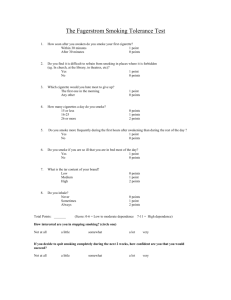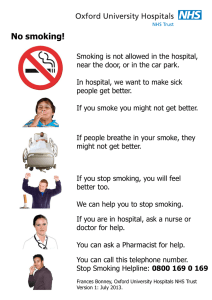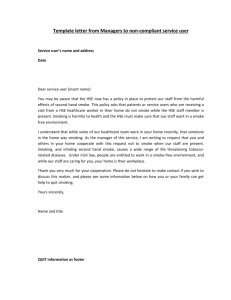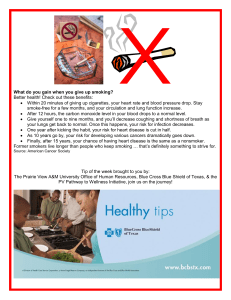USG Paper Proposed Smoke-free environment throughout University residences 1. Executive Summary
advertisement
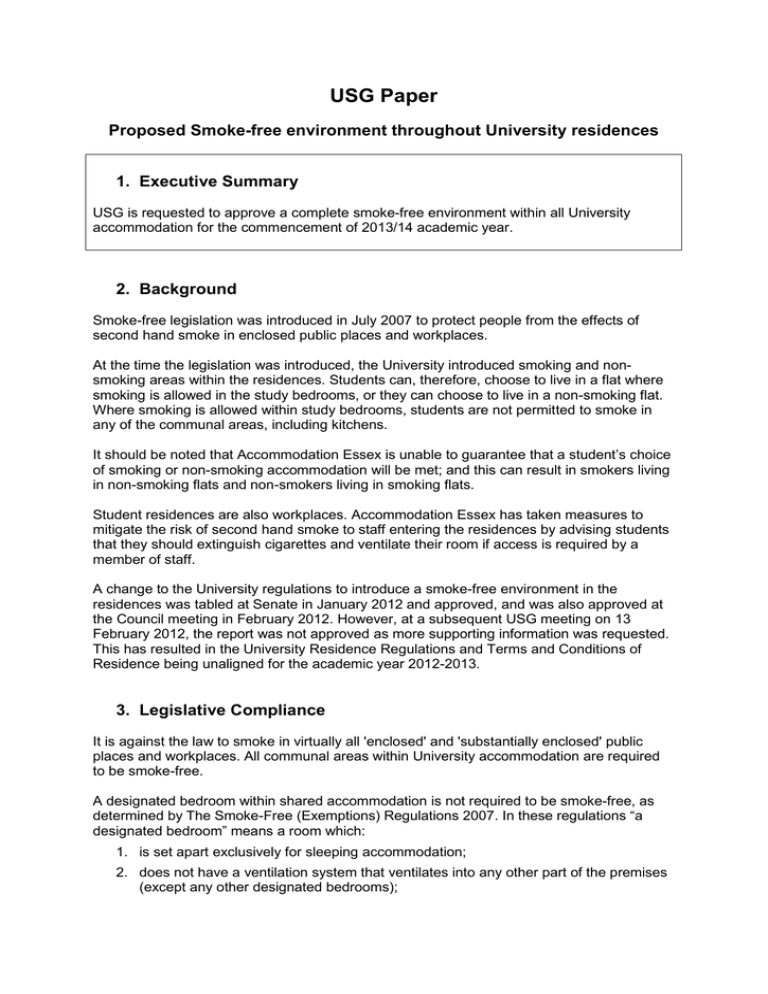
USG Paper Proposed Smoke-free environment throughout University residences 1. Executive Summary USG is requested to approve a complete smoke-free environment within all University accommodation for the commencement of 2013/14 academic year. 2. Background Smoke-free legislation was introduced in July 2007 to protect people from the effects of second hand smoke in enclosed public places and workplaces. At the time the legislation was introduced, the University introduced smoking and nonsmoking areas within the residences. Students can, therefore, choose to live in a flat where smoking is allowed in the study bedrooms, or they can choose to live in a non-smoking flat. Where smoking is allowed within study bedrooms, students are not permitted to smoke in any of the communal areas, including kitchens. It should be noted that Accommodation Essex is unable to guarantee that a student’s choice of smoking or non-smoking accommodation will be met; and this can result in smokers living in non-smoking flats and non-smokers living in smoking flats. Student residences are also workplaces. Accommodation Essex has taken measures to mitigate the risk of second hand smoke to staff entering the residences by advising students that they should extinguish cigarettes and ventilate their room if access is required by a member of staff. A change to the University regulations to introduce a smoke-free environment in the residences was tabled at Senate in January 2012 and approved, and was also approved at the Council meeting in February 2012. However, at a subsequent USG meeting on 13 February 2012, the report was not approved as more supporting information was requested. This has resulted in the University Residence Regulations and Terms and Conditions of Residence being unaligned for the academic year 2012-2013. 3. Legislative Compliance It is against the law to smoke in virtually all 'enclosed' and 'substantially enclosed' public places and workplaces. All communal areas within University accommodation are required to be smoke-free. A designated bedroom within shared accommodation is not required to be smoke-free, as determined by The Smoke-Free (Exemptions) Regulations 2007. In these regulations “a designated bedroom” means a room which: 1. is set apart exclusively for sleeping accommodation; 2. does not have a ventilation system that ventilates into any other part of the premises (except any other designated bedrooms); 3. does not have any door that opens into smoke-free premises which is not mechanically closed immediately after use; and 4. is clearly marked as a bedroom in which smoking is permitted. Evidence of smoking in communal areas within residences is an ongoing issue, with students frequently smoking in kitchens in flats where smoking is allowed in the study bedrooms. Study bedrooms in cluster flats open onto communal corridors, which are designated as smoke-free. Study bedroom doors do not have mechanical door closers. Therefore, the University is not compliant with the legislation. Legislation requires persons who control or manage smoke-free premises to prevent smoking from taking place. Legislation does not cover employees, who as part of their duties are required to enter smoking bedrooms. However, employers have a duty of care to take reasonable precautions to protect the health of their employees. 4. Exposure to Second hand Smoke There is a risk of exposure to second hand smoke for both employees working within the residences and to non-smoking students living in residences where smoking is allowed. Due consideration must also be given to members of staff and students who may be pregnant, as any exposure to second hand smoke will also expose the unborn child. Employers are required to undertake a risk assessment to reduce the level of exposure to tobacco smoke, as far as is reasonably practicable. A risk assessment has therefore been undertaken by Linda McCanna, General Manager, Accommodation Essex. Dr Joanna Carrington, Health and Safety Adviser and Lara Carmel, Head of Occupational Health provided advice and information. The Government’s independent Scientific Committee on Tobacco and Health reported in 2004 that exposure to second hand smoke contributes to a range of serious medical conditions, including: Lung cancer Heart disease Asthma attack Reduced lung function In addition, the US Surgeon General concluded in 2006 that: Second hand smoke causes premature death and disease in adults who do not smoke Exposure of adults to second hand smoke has immediate adverse effect on the cardiovascular system and causes coronary heart disease and lung cancer The scientific evidence indicates that there is no risk-free level of exposure to second hand smoke The World Health Organisation has classified second hand smoke as a known human carcinogen. The US Environmental Protection Agency has classified second hand smoke as a "class A" human carcinogen, which is in the same category as asbestos, arsenic, benzene and radon. Because there are no known safe levels of exposure to second hand smoke, The National Institute for Occupational Safety and Health (NIOSH) recommends that exposure to second hand smoke is reduced to the lowest possible levels. Separating smokers from non-smokers and ventilating rooms and kitchens cannot prevent exposure if people still smoke inside the flats. 5. Exposure to Particulates There is no research in the medical literature as yet that shows cigarette odours cause or contributes to medical conditions such as those detailed above. Research does show that particles from second hand tobacco smoke can settle into dust and onto surfaces and remain there long after the smoke is gone – some studies suggest the particles can last for months. Studies have shown that the particles that settle from tobacco smoke can form more cancer-causing compounds. The compounds may be stirred up and inhaled with other house dust, but more may be absorbed through the skin or accidentally taken in through the mouth. No actual cancer risk has been measured, but the health risks of third hand smoke are an active area of research. Where Housekeeping staff are undertaking a deep clean at the end of the licence period, there is a risk of exposure to particulates from tobacco smoke from curtains, carpets and soft furnishings. The act of cleaning releases particulates back into the air. 6. Result of Risk Assessment The risk assessment concludes that exposure to second hand smoke poses a serious risk of harm to non-smoking students living in residences where smoking is allowed and a significant risk of harm to employees working within the University residences. The risk assessment is attached at Appendix 2. 7. University Benchmarking A number of universities have been surveyed in relation to their smoking policy within their accommodation, with the following results: Of the 39 responses received, 34 operate a complete smoking ban throughout their accommodation. 5 allow smoking in bedrooms, with 1 of these moving to a complete smoking ban for next academic year and 2 others currently considering this move. Of those institutions that offered information on outside smoking facilities, many provide designated smoking areas with ash bins for their residents, but only a small number provide smoking shelters. Many of those surveyed experienced very little opposition from their students when changing towards a complete smoking ban. There was a small amount of feedback in relation to a reduction in disregard for nosmoking rules, following a move from partial smoking to a complete ban. The University is now amongst a minority of higher education institutions in providing smoking facilities within residences. It is proposed that the University takes action to move in line with common practice. 8. Other Considerations Each study bedroom door could be fitted with a mechanical closer to ensure compliance with the legislation. The cost of a single mechanical closer, including VAT and labour is £55.00. The total cost would be £147,565 for the main Colchester campus. The total cost for University Square, Southend would be £27,280. This figure excludes the studio flats, as they already have mechanical door closers fitted. The above cost for the main Colchester campus excludes the Quays residences. The Quays will become entirely smoke free when ownership passes to Uliving. The new accommodation at the Meadows will also be smoke free. The introduction of a smoke free environment in the residences requires consideration for alternative smoking facilities. Estimated costs for smoking shelters in designated smoking areas are £3,000 per shelter plus £1200 for ground work per shelter and £400 per annum for upkeep. Approximately 7 shelters would be required on the Colchester campus and 1 shelter at University Square. The introduction of smoking shelters would be subject to planning consent. Areas of the residences set aside as smoking rooms require a higher level of planned and reactive maintenance to address degradation to paintwork, carpets, soft furnishings and curtains. If a smoke free environment is not introduced across the residential establishment, more areas of residence on North and South campus would need to be set aside for students who wish to smoke following the transfer of the Quays to Uliving, which will impact adversely upon the cost of planned and reactive maintenance. 9. Consultation The Students’ Union Sabbatical Officers in principle support the decision towards a smoke free environment in the residences, provided that adequate alternative facilities are available for smokers and the change is communicated in an effective and timely manner. There is adequate time for the University to consider and implement a complete ban on smoking in residences for the intake of new students in September 2013. The University’s Health and Safety Advisory Service and Occupational Health Service support the introduction of a smoke free environment in the residences. Estates Management supports the introduction of a smoke free environment in the residences. Unison supports the introduction of a smoke free environment in the residences. 10. Conclusion The residences currently do not meet smokefree legislative requirements. If the residences were upgraded to meet these requirements at a total cost of £175k, there would remain a significant risk to staff and non-smoking students from second hand smoke and an unknown risk from other particulates. The risk is such that the University could be exposed to future compensation claims against it from current and former employees and students. 11. Recommendations It is recommended that the University approve a complete smoke free environment throughout all University accommodation for the commencement of 2013/14 academic year. It is further recommended that the University provide smoking shelters at both Colchester and Southend residences, excluding the Quays and Meadows, at a total cost of £30k.

